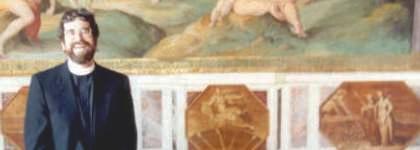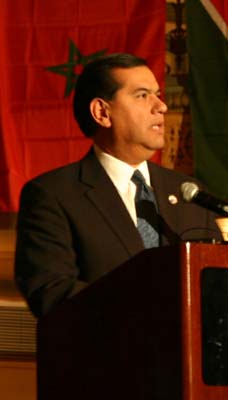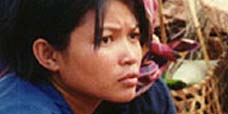
For the past 13 years, Kenya RPCV Guy Consolmagno has held one of the most secure and prestigious posts in the planetary sciences, as one of the Pope's 12 personal astronomers, dividing his time between the Vatican's observatory at the papal summer palace at Castel Gandolfo in Italy and a giant telescope in Tucson, Arizona. The idea that the Pope has his own hit squad of astronomers may come as a surprise, but Consolmagno laughs off any suggestions of a hidden agenda to spot God hiding behind Alpha Centauri. "The Vatican observatory was first set up in 1891 by Pope Leo XIII to provide a bridge between religion and the sciences," he says. "In many ways, it was just a coincidence that the Pope decided to show an interest in astronomy - but a very happy coincidence. Looking at the stars not only combines the human with the transcendent, it has no financial value. Nothing I discover will ever require patent lawyers, so there's no danger of compromising mine or the church's integrity."
Guy Consolmagno enjoys a rare academic freedom as papal astronomer
Knocking on heaven's door
No form-filling, no committees - the papal astronomer enjoys a rare academic freedom, finds John Crace
Tuesday May 9, 2006
The Guardian
When a leading astronomer tells you it could all end at any time, your first reaction is likely to be to say your goodbyes and head for home. As it happens, though, Brother Guy Consolmagno is talking about his job, rather than the chances of Earth being hit by a meteorite. "As a Jesuit, I've taken a vow of obedience," he says. "If the Father General tells me to pack my bags and go and work in a soup kitchen, that's what I'll do."
One of the other vows Consolmagno has taken is poverty: he doesn't own the jeans he's wearing, he had to get permission to buy an iPod, any money he earns from his work is given away to charity and all his expenses have to be agreed in advance. So one can safely assume that any job swap won't leave him in a worse financial position.
The reality is that the chances of Consolmagno getting his marching orders are virtually nil. For the past 13 years, he has held one of the most secure and prestigious posts in the planetary sciences, as one of the Pope's 12 personal astronomers, dividing his time between the Vatican's observatory at the papal summer palace at Castel Gandolfo in Italy and a giant telescope in Tucson, Arizona.
Pure science
"It's my dream job," he says. "I get to do all the things I've always wanted to, with none of the commercial pressures that affect other scientists. I can take on research projects that have only a 30% chance of success and pursue ideas that have no financial benefits. It really is science in its purest form.
"I don't have to waste any time filling in grant applications or sitting on endless, boring committees. And, better still, because we have a reputation for independence, all sorts of doors have opened up because people want to work with us. The third vow I took was one of chastity and many of my collaborators reckon it's a small price to pay for avoiding all the hassle they have to go through."
The idea that the Pope has his own hit squad of astronomers may come as a surprise, but Consolmagno laughs off any suggestions of a hidden agenda to spot God hiding behind Alpha Centauri. "The Vatican observatory was first set up in 1891 by Pope Leo XIII to provide a bridge between religion and the sciences," he says. "In many ways, it was just a coincidence that the Pope decided to show an interest in astronomy - but a very happy coincidence. Looking at the stars not only combines the human with the transcendent, it has no financial value. Nothing I discover will ever require patent lawyers, so there's no danger of compromising mine or the church's integrity." Consolmagno acknowledges the Vatican and science may seem to be uneasy bedfellows. "There's no doubt the Vatican screwed up over Galileo and everyone remembers a good screw-up. But the dispute only lasted for a couple of years. Up till 1631, Galileo's work was praised by the church and then he was suddenly put on trial. Reading through the court transcripts provides no real insight into what problems the church had with Galileo or why he was found guilty. But, in any case, he was back in favour by 1663."
The mystery deepened in 1992 when the church apologised for bringing Galileo to trial without specifying what charges he faced, but Consolmagno is at pains to point out that the Vatican has always accepted Galilean science. "We've been teaching good science in Catholic schools for more than 300 years," he says, "and it certainly hasn't been based on the Ptolemaic system."
The need to believe
There is, of course, one prerequisite for a papal astronomer: a belief in a creator God. This is not to say Consolmagno is a young earth creationist. He happily goes along with the theory that the universe started with the Big Bang some 13.7bn years ago and that life has evolved since; what he does add to the mix is the idea that there was an all-powerful God who planned the whole thing, finds his creation good and is so in love with it that he chooses to become incarnate.
This puts him at odds with those scientists who view the same data and remain atheists. "Most of those who argue there is no God are evolutionary biologists who are locked into a 19th-century Newtonian cause-and-effect belief system, which thinks it has all the answers," he says. "This was a completely understandable response to a religious belief system that had previously thought it had all the answers. The fact is, though, that biology has not developed as quickly as physics. Quantum physics has meant that we have had to unlearn many of the things we previously regarded as certainties, and I'm sure biologists will face similar challenges in the future.
"In the same way, we astronomers may have to rethink quantum physics in several hundred years' time. There are so many things we don't know and that we don't even know we don't know. But one thing of which I am certain is that everything we do discover about the universe brings us closer to understanding God's creation. Religion gives you the confidence to do science and the reason to do it."
The title "papal astronomer" is not quite as hands-on as it sounds. In the 1920s, the Pope delegated the running of his observatory to the Jesuits and has no real influence over the selection of his astronomers. Consolmagno met Pope John Paul II only once. He has had no contact with Pope Benedict XVI and nor does he expect to. "We're pretty much left to our own devices," hesays, "though from time to time our director reports back to the Vatican Pontifical Academy of Sciences."
He says it was a total surprise to get the letter from Rome summoning him to join the observatory just four years after becoming a Jesuit - "I guess they were short of youngish astronomers" - but to almost everyone else who knew him, it seemed the obvious next step on his career path.
"I grew up in Birmingham, Michigan, where my father was a first-generation Italian immigrant working as a PR and journalist for the auto trade, and my mother was an Irish-American teacher," he says. "They were both very religious and I was brought up with both a strong Catholic faith and an understanding of the importance of education. I was just eight years old when the Russians launched Sputnik and I spent hours looking up at the skies with a telescope."
His obsession with astronomy grew in tandem with the US manned space programme, but was almost killed off when he was sent to the University of Detroit high school in 1965. "It was a Jesuit school, which believed children were far better off studying the classics, debating, literature and history rather than the sciences," he says. "Science was seen as something you could come back to later when you had mastered the other subjects and the upshot was that at 19 I was all signed up to be a history major at Boston College."
It was chance that decided otherwise. "I had a friend who was going to Massachusetts Institute of Technology and I took a look at the pinball machines, the weekend movies and the science-fiction library and wanted a part of it. So I signed up to do earth and planetary science just because it had the word planet in the title. I had no real idea what it involved."
In 1971, most US undergraduates were focused on sex, drugs and rock'n'roll with a bit of anti-Vietnam protesting on the side. But Consolmagno concentrated on the science. "MIT had a ratio of nine men for every woman, so there wasn't much sex," he laughs. "I was stupid enough without taking drugs. Unlike Clinton, I didn't even get round to not inhaling. And I was never that political, as I could always see both sides of any argument. I did have long hair, but then everyone did."
On the course, he worked on a computer model of the moons of Jupiter, based on the assumption they were half-rock and half-ice and that radioactive elements could melt the ice. "It was exciting stuff," he says. "Atone time, I was ahead of astronomers working at the cutting-edge Jet Propulsion Laboratory.
Ten years later, they eventually managed to send a probe to Jupiter and found all my predictions were accurate, although my reasons were wrong. I had overestimated some things by a factor of 10 and underestimated others by a similar amount and they had all somehow cancelled each other out. It was a good lesson in humility for any scientist."
Astronomy for all
For the next 10 years, Consolmagno continued to play in the scientific big leagues, doing a doctorate in Arizona before returning to the east coast, to Harvard and MIT, where he was employed as a research post-doc. By the time he reached 30, he decided astronomy wasn't enough - "I couldn't see the point of studying the stars when so many people were dying elsewhere in the world of hunger." So he joined the Peace Corps.
"I was all ready to go wherever they sent me and to do whatever they wanted," he says. "So I was initially mortified to be sent to the University of Nairobi to teach astronomy. But my experiences taught me that poor people have as much interest in the stars as those of us living in the west, and this reconciled me to the idea that astronomy belongs to us all."
He returned to the US and continued teaching and writing until he hit another milestone. "At 40, I was happy but not content," he says. "I had a good job, but I was lurching from one unsatisfactory relationship to the next without ever believing I was going to find the person with whom I wanted to settle down and have kids. And then it just seemed right for me to become a Jesuit. It wasn't a decision I took lightly, but it was one that everyone who was close to me supported. Even my ex-sweethearts rather insultingly told me they always knew I'd end up a priest."
It's a journey that is not yet complete- he will take his final vows in September -but he has had no doubts along the way. And he has also got to do some exciting science. "Some projects have gone wrong and fizzled out," he admits, "but I've also had the opportunity to do things that no one else had ever bothered with.
"The Vatican has a fantastic collection of meteorites and I decided it would be interesting to measure their density.
Through this, I discovered that asteroids were half the density you might expect - which meant they weren't solid, as we had previously thought, but were made up of gravel instead. This has significantly added to our knowledge of the formation of our solar system."
Consolmagno is now working on the density of objects in the Kuiper belt beyond Neptune but, for all his scientific desire for certainty, he is happy for some things to remain a mystery. Such as what happens when we die. After all, if anyone should know it's the Pope's astronomer. He looks up and laughs. "When I've got the data, I'll be happy to let you know."
Curriculum vitae
Name: Brother Guy Consolmagno
Age: 55
Job: Vatican astronomer; curator of the Vatican's meteorite collection; member of the division for planetary sciences of the American Astronomical Society
Books: Turn Left at Orion; The Way to the Dwelling of Light; Worlds Apart
Likes: chocolate, Harry Potter
Dislikes: chewing gum, know-it-alls





















